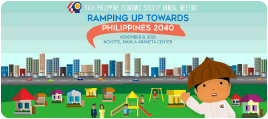Economics of Pandemics: From Response to Recovery to Resilience
9-13 November 2020 | Zoom Webinar & Facebook Live
In view of the restrictions on mass gatherings due to the COVID-19 pandemic, all plenary and breakout sessions of the 58th PES Annual Meeting and Conference will be held online and free of charge.
The Philippine economy is more interconnected with the world than ever; and within the economy, the domestic markets are more interdependent with each other. Economic risks and shocks have become difficult to isolate, and their impacts affect multiple actors and sectors. Global and local trends and events such as climate change and natural disasters, rise of disruptive technologies, international trade conflicts, and the COVID-19 pandemic, have dealt challenges on the country’s growth, stability, and development trajectory. Some of the risks and shocks are addressed with the conventional automatic stabilizers, some with the aid of government policies, while others with market and non-market solutions. How should the country rethink its short- and long-term response strategies to economic risks and shocks, both predictable and unpredictable? What social and economic mechanisms should be put in place to support the most affected and vulnerable sectors of society? How crucial are exit strategies in ensuring an efficient transition from crisis period to normal times? It is important to pave the recovery path in consideration of the impact on society, poverty, inequality, labor, and human development. Likewise, it is important to recognize that adverse shocks like the pandemic brings an opportunity for the Philippines to re-think and recalibrate its reform programs. To ensure that the economy mitigates risks and withstands future shocks, how can resilience be built in the Philippine economic system in a way that is sustainable and equitable?
For inquiries:
The PES Secretariat
c/o Philippine Social Science Council
Tel No.: (632) 8-929-2671
Email: pes.eaea@gmail.com

 Philippine Economic Society (PES)
Philippine Economic Society (PES)
